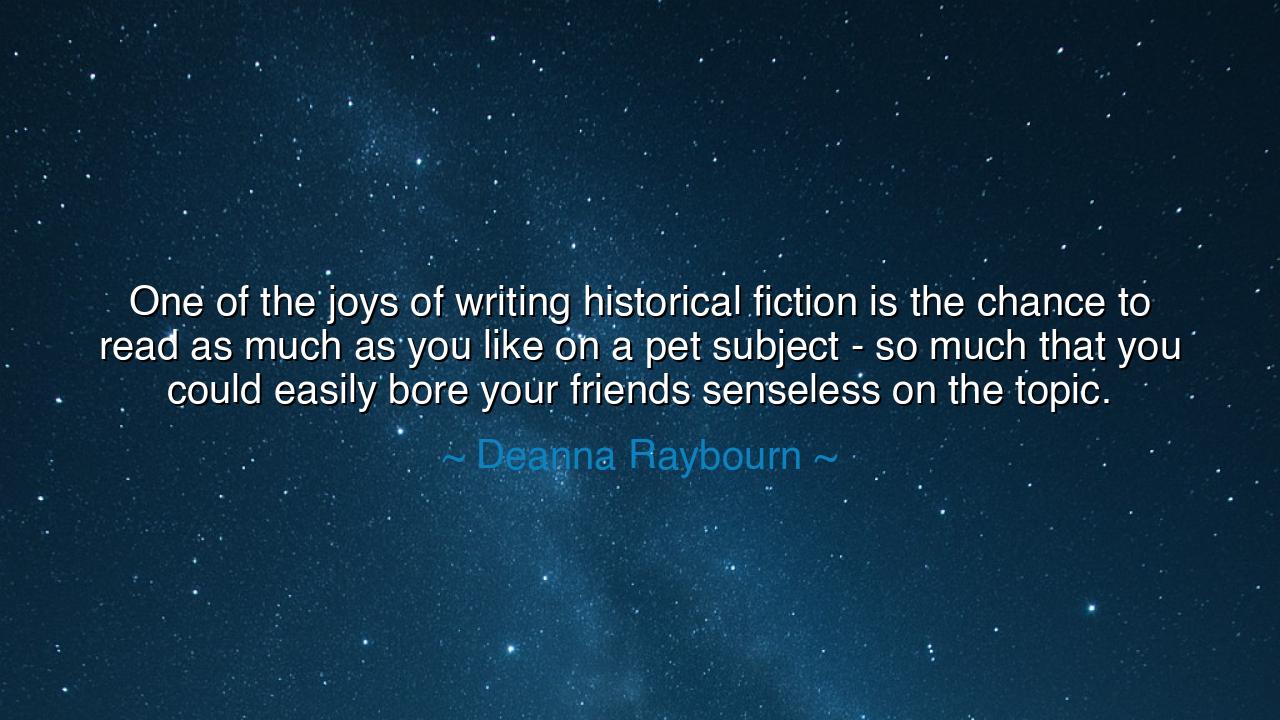
One of the joys of writing historical fiction is the chance to
One of the joys of writing historical fiction is the chance to read as much as you like on a pet subject - so much that you could easily bore your friends senseless on the topic.






Hear, O keepers of knowledge and lovers of stories, the words of Deanna Raybourn, who proclaimed with delight: “One of the joys of writing historical fiction is the chance to read as much as you like on a pet subject—so much that you could easily bore your friends senseless on the topic.” Within this playful confession lies a truth both ancient and eternal: that passion, once ignited, drives the soul deeper than necessity alone, and that the pursuit of learning is sweetest when guided by love, not duty.
The ancients knew well the allure of a pet subject, a chosen fascination that calls the mind again and again, demanding hours of thought and endless return to the written word. Did not Aristotle spend long years classifying the creatures of the earth, while Archimedes lost himself in the mysteries of numbers and water? Their obsessions, strange to some, bore fruit for generations. For when a person is gripped by passion, they study not out of compulsion but out of joy, even when their friends, uninitiated in the same fire, grow weary of listening.
Raybourn speaks from the heart of the historical novelist, who must weave truth with imagination. To craft such tales requires immersion in the fabric of another age—its clothes, its food, its battles, its daily life. This immersion demands hours upon hours of study, far beyond what might ever appear upon the page. Yet herein lies the joy: to drink deeply from the well of history, until one knows the taste of its waters so thoroughly that the past feels alive once more. To others, such detail may seem excess, but to the writer, it is nourishment.
Consider the great Sir Walter Scott, whose novels awakened a passion for medieval history across Europe. He poured over ancient manuscripts, laws, and chronicles until his knowledge seemed boundless. Friends may have sighed as he recounted obscure details of Scottish clans, yet his pet subject gave birth to stories that stirred nations and revived a love for heritage. What seemed tiresome in conversation became immortal in art. Thus, Raybourn’s jest is no small thing—it is a reminder that deep passions, though sometimes misunderstood, can yield treasures for the world.
Her words also unveil the paradox of learning: that what fascinates us may alienate others. To speak endlessly on a beloved subject can weary those who do not share our hunger. Yet this is the nature of true devotion—to pursue knowledge not for applause, but because the heart demands it. And though friends may grow restless, the pursuit itself shapes the mind, enriches the soul, and prepares the ground from which great works are born.
The lesson is this: cherish your pet subject, whatever it may be, and follow it with diligence. Do not despise the passion that consumes you, nor be ashamed if others do not share it. For the world advances by the hands of those who dared to study deeply what others overlooked. Whether your obsession lies in history, science, art, or philosophy, let it root deeply within you, for from such roots come branches that others may one day shelter beneath.
Practically, this means giving yourself permission to dive into learning, to read widely, to study thoroughly, and to follow curiosity where it leads. Write down your discoveries, even if only for yourself. Share them wisely, with those who will listen, and pour them into works—be they books, talks, or deeds—that may outlast you. Let your passion serve not only your delight but the good of others, as Raybourn’s novels bring both knowledge and joy to her readers.
So let this teaching endure: joy in learning is the seed of creation. Though others may grow weary of your subject, do not abandon it, for what tires their ears may one day inspire their hearts when shaped into story, art, or wisdom. Follow your passion with courage, and like the great storytellers before you, you may transform your private obsession into a gift for generations yet to come.






AAdministratorAdministrator
Welcome, honored guests. Please leave a comment, we will respond soon